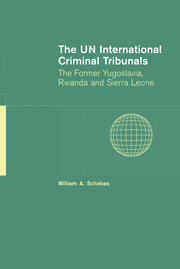Book contents
- Frontmatter
- Contents
- Preface
- Table of cases
- Table of legislative provisions
- List of abbreviations
- PART I Establishment of the tribunals
- PART II Jurisdiction
- 4 Territorial, personal and temporal jurisdiction
- 5 Subject-matter jurisdiction generally
- 6 Genocide
- 7 Crimes against humanity
- 8 War crimes
- PART III Substantive and procedural aspects of prosecution
- PART IV Organisation of the tribunals
- Bibliography
- Index
7 - Crimes against humanity
Published online by Cambridge University Press: 05 June 2012
- Frontmatter
- Contents
- Preface
- Table of cases
- Table of legislative provisions
- List of abbreviations
- PART I Establishment of the tribunals
- PART II Jurisdiction
- 4 Territorial, personal and temporal jurisdiction
- 5 Subject-matter jurisdiction generally
- 6 Genocide
- 7 Crimes against humanity
- 8 War crimes
- PART III Substantive and procedural aspects of prosecution
- PART IV Organisation of the tribunals
- Bibliography
- Index
Summary
Crimes against humanity are at the core of the subject-matter jurisdiction of the three tribunals. According to the 2005 Darfur Commission, crimes against humanity ‘are particularly odious offences constituting a serious attack on human dignity or a grave humiliation or degradation of one or more human beings (for instance, murder, extermination, enslavement, deportation or forcible transfer of population, torture, rape and other forms of sexual violence, persecution, enforced disappearance of persons)’. Not only are crimes against humanity the common denominator of the three statutes, they are also central to virtually all of the indictments.
Genocide is often described as an aggravated form of crime against humanity, and while such statements may be an oversimplification, that the two categories of crime are cognates can be seen from the indictment policy of the Prosecutors and the judgments themselves. There have been no convictions for genocide where a conviction for crimes against humanity could not also have been sustained. Similarly, it is extremely rare for any of the tribunals to convict a person for war crimes that are not accompanied by charges of crimes against humanity. The real ‘umbrella rule’ of the tribunals is the prohibition of crimes against humanity, a relatively broad concept that captures most forms of atrocity committed against innocent civilians, including war crimes in the classic sense. If the statutes of the three tribunals only contemplated crimes against humanity within their subject-matter jurisdiction, this would change little in terms of their operations, except to reduce the length of trials and the legal debates about arcane subjects.
- Type
- Chapter
- Information
- The UN International Criminal TribunalsThe Former Yugoslavia, Rwanda and Sierra Leone, pp. 185 - 225Publisher: Cambridge University PressPrint publication year: 2006



